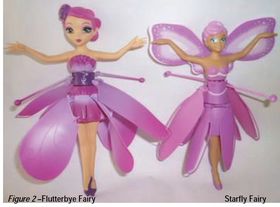 Flying toy manufacturer, Spin Master, is suing its former technology company and its new business affiliates for allegedly infringing Spin Master’s Flutterbye flying toy fairy’s copyrights and trade dress by selling the competing Starfly fairy. Indeed, the two companies are no strangers to litigation and are currently engaged in a patent infringement lawsuit in Illinois involving remote controlled airplanes and helicopters. Here, Spin Master claims to have introduced the Flutterbye toy in 2013, which fairy doll incorporates a new technology that allows a customer to control the flying fairy using only one’s palm. Spin Master asserts that the Flutterbye received numerous top toy awards and has been a commercial success. The Flutterbye fairy figurine has received several copyright registrations and several other copyright applications are pending for the flower designs, stardust, and packaging.
Flying toy manufacturer, Spin Master, is suing its former technology company and its new business affiliates for allegedly infringing Spin Master’s Flutterbye flying toy fairy’s copyrights and trade dress by selling the competing Starfly fairy. Indeed, the two companies are no strangers to litigation and are currently engaged in a patent infringement lawsuit in Illinois involving remote controlled airplanes and helicopters. Here, Spin Master claims to have introduced the Flutterbye toy in 2013, which fairy doll incorporates a new technology that allows a customer to control the flying fairy using only one’s palm. Spin Master asserts that the Flutterbye received numerous top toy awards and has been a commercial success. The Flutterbye fairy figurine has received several copyright registrations and several other copyright applications are pending for the flower designs, stardust, and packaging.
Plaintiff alleges that Defendants approached Plaintiff about a possible collaboration to distribute the toy outside of the United States, which Plaintiff declined. Plaintiff contends that “after seeing the success of Spin Master’s Flutterbye fairy toy, and rather than independently creating a distinct product, Defendants Brix, CYI and Rehco together engaged in a plan to create a look-alike flying fairy product in an attempt to unfairly capitalize on Spin Master’s success.” Aside from copying original elements of the toy itself, Plaintiff claims that Defendants use confusingly similar packaging and marketing channels, including similar YouTube commercials.
https://www.youtube.com/watch?v=xC3Som20tBE
Because each party’s respective product packaging prominently displays their respective trademarks, it will be interesting to see if customers are confused about the source of the products. See Bristol-Myers Squibb Co. v. McNeil-P.P.C., Inc., 973 F.2d 1033, 1045-46 (2nd Cir. 1992) (holding that prominently displayed trade names on respective products “weigh[ed] heavily against a finding of consumer confusion resulting from the overall look of the packaging”) (preliminary injunction denied).
The case is Spin Master, Ltd. v. Brix ‘N Clix Co., Ltd., CV14-02808 PSG (C.D. Cal. 2014).
 Los Angeles Intellectual Property Trademark Attorney Blog
Los Angeles Intellectual Property Trademark Attorney Blog

